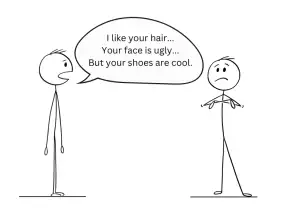leadership in education
Difficult Conversations: Why you should ditch the praise sandwich...
Why you should ditch the praise sandwich – And what you should do instead…
by Karen Amos
Every time I run a Managing Difficult Conversations training course, I have at least one delegate who advocates using the ‘Praise Sandwich’ as a structure for their conversation or feedback. I can understand why and I’ll come onto that in a moment, but first a quick explanation of what this is for those who have never heard of it.
The praise sandwich is an approach to giving feedback that starts with something positive, then adds the negative feedback, followed up by something positive to close. There is another school of thought that calls this a **** sandwich, for obvious reasons, but let's stick with the 'praise' version to save our sensibilities!
So let's look at why we use it - then we can look at why we shouldn't in a moment.
There are several reasons why the praise sandwich seems attractive to the feedback-giver. One of the main ones though, is that that we erroneously see this as ‘kind’. I mean, think about it – of course it’s kind. We’re saving the person’s feelings by telling them all the great stuff they do and leaving them on a high – fully motivated to go back to work. And we can breath a sigh of relief and tell ourselves, 'That went well...'.
Except…
OK, rather an extreme example, but the effect is the same – the message will be either lost, or misinterpreted. You’ll come across as either dishonest and manipulative, or you won’t get the change you wanted in the first place.
Years ago I had a manager who used this approach all the time. I had no idea whether I was doing a great job, or whether I was on the verge of being sacked!
So what should we do instead?
Surely, if we don’t fluff up the message at the end with something positive, we’ve a demotivated, or even irate member of staff on our hands?
Actually, I don’t believe that needs to be the case. We just need to say what we need to say - but the key is to say it well.
I like to call this the 4 C's:
- Courage - Having the backbone to deal with situations instead of burying our head in the sand and hoping it will go away
- Clarity - Saying what you have to say, getting to the point and not fluffing up the message
- Compassion - In our haste to deliver the message, it's sometimes easy to forget there's another person on the other end of this conversation, so let's treat people as we would like to be treated ourselves
- Collaboration - Working 'with' rather than doing 'to'. This coaching approach is a sure fire way to build commitment and achieve positive outcomes
So hopefully you can see that by using a coaching approach to give feedback and have those ‘difficult conversations’ we build commitment, accountability and personal responsibility. It’s supportive, but definitely not 'fluffy bunny'.
So here’s a quick coaching question to finish off…
- What are you most worried about when having a ‘difficult conversation’ with your team and what effect does this have on your approach?
If you’re interested in learning tips, tools and how to take a coaching approach for better ‘difficult conversations’, check out our latest live, interactive training workshops.
Click on the link below to find out more:
Or why not EMAIL US, or book in an informal chat using the button below. We'll find out about the support you need and provide you with a no-obligation quote.
 Karen Amos is an executive coach and Director and Founder of BrightBird Coaching & Training. She supports business owners, managers and education leaders to get the best out of themselves and their teams. She brings a down-to-earth approach to improving working lives through better leadership, communication and working relationships.
Karen Amos is an executive coach and Director and Founder of BrightBird Coaching & Training. She supports business owners, managers and education leaders to get the best out of themselves and their teams. She brings a down-to-earth approach to improving working lives through better leadership, communication and working relationships.
Tel: 07714 855757 or email: [email protected]
5 Questions to Find the Silver Bullet to Great Leadership...
5 Questions to Find the Silver Bullet to Great Leadership...
by Karen Amos
I bring you leadership bad news and good news... and 5 coaching questions to help you find the silver bullet to great leadership.
I had an interesting conversation with a client recently about people’s expectations of leadership. She said many upcoming and existing leaders in her teams are looking for that ‘Silver Bullet’ that solves all their leadership problems. Funnily enough, this cropped up again a few days later with another business contact.
The fact is, anyone who is interested in personal and professional development will find themselves inundated with book suggestions and social media posts on how ‘this one thing’ will ‘transform’ your professional life/leadership style/financial situation… blah, blah, blah…
Do I sound a bit cynical? Well I am. I don’t want to throw shade on other people’s work and indeed I am an avid collector and reader of said books and posts. I love learning. But here’s the kicker – learning isn’t doing.
And how easy is it to collect these books and blogs and not only never read them, but certainly not put them into practice? I had a friend who had every self-help book known to woman-kind on her shelves. Yet, she couldn’t understand why she had so many, but wasn’t rich/thin/motivated/calm [delete as appropriate].
The reason was simple. She’d read the first chapter on each one, found she actually had to change something for this to work and moved onto the next new thing.
So let’s get the bad news over with… There is no single ‘Silver Bullet’ to good leadership.
There. Wasn’t so bad was it? Perhaps a little disappointing, but I’m sure you knew already that any small hopes you had of any easy fix weren’t rooted in reality, didn’t you?
The fact is, leadership and people management in particular, is tough. It’s messy, gnarly, emotive and I think (please tell me this isn’t just me), all the more fascinating for it.
So what’s the good news? After all, I did promise some…
Well here it is...
You already have everything you need to be an amazing leader of people.
You don’t need a silver bullet because you have YOU!
You just need the courage and some small skills and techniques to put that into place. No gimmicks, no quick fixes, just good, honest person-centredness, a sound ethical base and an eye on what’s really important.
That’s why I love Bill George’s Authentic Leadership approach. It’s about being yourself, not some parody of a top ‘business guru’, ending up being a caricature like The Office’s David Brent.
So where to start? How do you cut through all the information out there and know what you don’t know?
Here are five coaching questions to get you started…
- What kind of leader or manager do I aspire to be?
- Which people in my past would I like to emulate? What was so great about them?
- What am I most afraid of when it comes to managing people and leadership? (Be honest here – this exercise is for your eyes only.)
- Who do I know who deals with this issue well? What do they do that I can put into place?
- What one step can I take right now that will help me overcome this barrier?
I’d love to hear your thoughts on this and remember, you can contact us any time for an informal chat, even if it’s just for a listening ear!
If you’d like to learn more about how to take a coaching approach to Managing Difficult Conversations and people management, we’ve just launched our Summer 2024 public courses.
Click on the link below to find out more:
Or why not EMAIL US, or book in an informal chat using the button below. We'll find out about the support you need and provide you with a no-obligation quote.
 Karen Amos is an executive coach and Director and Founder of BrightBird Coaching & Training. She supports business owners, managers and education leaders to get the best out of themselves and their teams. She brings a down-to-earth approach to improving working lives through better leadership, communication and working relationships.
Karen Amos is an executive coach and Director and Founder of BrightBird Coaching & Training. She supports business owners, managers and education leaders to get the best out of themselves and their teams. She brings a down-to-earth approach to improving working lives through better leadership, communication and working relationships.
Tel: 07714 855757 or email: [email protected]
How courageous is your leadership?
We have never needed courageous leaders more...
by Karen Amos
Leadership is all over the news. Firstly there's the Post Office scandal. Much of this will be new to many people, but the fact is, this is far from a new issue. I was first aware of it around 2010, as an acquaintance was one of the Post Masters in question. He ended up taking out a huge loan to patch up a financial hole, not of his making, or risk prosecution and lose the family business. The impact was devastating on his physical, mental and financial wellbeing. The situation was picked up and consistently reported on by media outlets such as Private Eye, Radio 4 and Panorama, but still no meaningful movement from either the Post Office, or indeed the government, despite them being well aware of this. People jailed, made bankrupt, family breakups and suicides. Still no-one stepped forward. Finally, a mainstream broadcaster ITV, created prime-time drama series and the government eventually commits to action.
Same with the ongoing situation with Ofsted inspections. It wasn't until the tragic death of Ruth Perry following her school's downgrading following an Ofsted inspection that a light was cast on what teachers, leadership teams and particularly Head Teachers have known for years - the process isn't fit for purpose. Untold stress and suffering within schools in the name of raising standards. Teachers and Heads reconciling themselves with feeling sick every week as an inspection was imminent and careers being wrecked, not to mention the toll on mental health. As with the Post Office scandal, this isn't 'just' the ruining of lives and livelihoods - people died.
So what's the cause of the problem? Tech? Comms? Process?
No, the cause lies with with leadership - specifically, cowardly, dishonest, unethical and self-serving leadership, which in truth is no leadership at all.
There are the leaders who focus on process, making sure everything can be monitored and that systems are in place. Those setting out the ‘business as usual’ mantra, when life is anything but. The leaders that force the perpetual direction of travel that involves people being asked to do more and more with fewer and fewer resources until those people break. Those priding themselves on being ‘decisive’, whilst never once pausing to look back and check where everyone else is on this journey. And if anyone’s lagging behind? - well, they need to get their backside in gear and quick. And finally, those leaders and business owners who seek to exploit the system, state, or people in order to make a quick buck.
Then there are inspirational leaders out there who ‘do the right thing’ by looking after their teams, clients and communities. These are the people who 'bend’ the rules where need be, provide reassurance and are understanding and empathetic to the needs of others. The leaders who understand the impact on those going through huge daily challenges such as the cost of living crisis and balancing home and work with pressures on childcare for example.
I believe we need strong, ethical leadership now more than ever and Authentic Leadership sets out the blueprint for this. The need for courage, vision, compassion and a strong set of ethical values. Above all, the ability to put these into positive action. As I’ve said before, Authentic Leadership isn’t, ‘Take me as you find me – warts and all.’ Anyone trying to lead a team with that attitude is, quite rightly, destined for failure. And it's certainly not 'fluffy bunny'. No, Authentic Leadership is the toughest thing you will ever do. It means having the courage to do what’s needed and the heart to do what’s right.
Here are a few coaching questions to get you started on checking how courageous your leadership style is...
- What do I stand for as a leader? What are my 'lines in the sand' I will never cross?
- Am I ever guilty of not following my own principles and ethics - and what causes this?
- How will I know when I'm 'doing the right thing'?
- What are the signs I may not be acting courageously as a leader - seen in myself and others? What impact does this have on me?
- What one thing could I put into place today that would ensure I was doing the right thing by others?
If you’d like to learn more about how to take a coaching approach to Managing Difficult Conversations and Effective People Management, we’ve just launched our Summer 2024 public courses.
Click on the link below to find out more:
Or why not EMAIL US, or book in an informal chat using the button below. We'll find out about the support you need and provide you with a no-obligation quote.
 Karen Amos is an executive coach and Director and Founder of BrightBird Coaching & Training. She supports business owners, managers and education leaders to get the best out of themselves and their teams. She brings a down-to-earth approach to improving working lives through better leadership, communication and working relationships.
Karen Amos is an executive coach and Director and Founder of BrightBird Coaching & Training. She supports business owners, managers and education leaders to get the best out of themselves and their teams. She brings a down-to-earth approach to improving working lives through better leadership, communication and working relationships.
Tel: 07714 855757 or email: [email protected]
3 Reasons Everyone Needs a Coach
3 Reasons Everyone Needs a Coach
By Karen Amos
As Bill Gates said… ‘Everyone needs a coach.’ And who am I to argue? I mean, the lad’s done OK for himself hasn’t he?
As a coach, I’m often asked, ‘Do you have a coach?’ The answer is, ‘Yes, I have several coaches.’
I have coaches for various aspects of my life and work, depending on what I need. For example, I have a long-standing coach supervisor who supports and challenges me to improve my own practice as a coach. I’ve also had business and personal coaches at critical points.
I’m writing this blog, as I had a realisation this morning I needed more coaching. This time it’s for physical fitness. Some of you may know I had a hip replacement in the spring. It was successful and I’m now getting my life and mental wellbeing back, being able to walk up my beloved mountains and get the space, peace and exercise I so need. (Even though I do spend a disproportionate amount of time asking myself what on earth I was thinking, when finding myself on a steep slope in the pouring rain!)
So back to my fitness coaching. Most people understandably assume that as a coach myself I’m hyper-motivated all the time and know all the nifty coaching techniques to successfully coach myself to whatever goal I choose. Which is kind of true, but here’s the problem – I’m only human.
That being human means that sometimes I can be a bit defeatist and even, dare I say it, a bit lazy. Yep, let’s face it, we all have our excuses ready from time to time don’t we?
To quote another famous sleb, ‘You can have what you want, or you can have your excuses.’ That one’s from good old Arnie and again, he seems to have done OK for himself too!
“YOU CAN HAVE WHAT YOU WANT OR YOU CAN HAVE YOUR EXCUSES”
So, with all that in mind, I’ve called my gym coach to discuss returning to paying her to allow me to complain, swear and turn into a sweaty mess for a couple of hours a week – otherwise known as gym classes.
Now, I have all the equipment at home and knowledge of training routines to crack on and get my fitness up to scratch again, so why don’t I just do that? Well, the same reasons I would recommend a coach for anyone at work, applies to me too.
1. Challenge
Your coach, whether that’s a leadership, fitness, business or any other type of coach, will push you out of your comfort zone. That ‘un-comfort’ zone is where the change that needs to happen, does happen.
Let’s stick with fitness as an example – you start off with great intentions, but within a very short space of time, you revert back to what’s comfortable. That’s just human nature – it’s how we’re wired – but to get meaningful change we have to enlist someone who’s going to challenge us. This is vital, whether that’s to do that extra set of reps with the weights, or to make that scary decision we’ve been putting off.
The important thing about challenge in coaching is that it’s done with positive intentions and to serve the agenda and goals of the coachee. This isn’t about the coach getting off on how uncomfortable they can make their clients. Any old dictator can do that!
2. Mindset
This goes along with the challenge. A good coach will help you envisage a step-up bigger than you would normally take yourself. They don’t take ‘no’ for an answer and will help you build a positive, can-do, growth mindset, not based on wishful thinking, but on affirmative, tangible action and results.
In short, a good coach helps you get out of your own way.
3. Accountability
Commitment makes or breaks success. Doing something once, however well will not bring you lasting success (even if that one thing is buying a winning lottery ticket. With the wrong mindset, you’ll have blown it in no time). As the US coach Tony Robbins describes, we need to take small, consistent steps to maintain lasting change.
Working with another person is a fantastic way to help build personal accountability. This is particularly true if you’re a senior leader or business owner, or even if you’re doing something for you, such as starting a new fitness programme.
The fact is, stating an intention out loud, particularly to someone whom you respect, means you are much more likely to follow through on your actions. Let’s face it, none of us like to be proved wrong, or wanting do we?
Additionally, paying for this means we feel we have personally invested something. We have skin in the game. It’s an uncomfortable fact, but this is why ‘free’ programmes often fail and have much fewer participants at the end. There’s just not enough investment personally from the participants. Not enough to lose. This way, we’re much more likely to dig deeper – if you’re a born and bred Yorkshire woman like me, you’ll always want to get your money’s worth! This inevitably means better results.
So the question is, how and from whom can you get the right level of challenge, positive mindset and accountability?
Hopefully that’s given you some insights into why all good coaches have coaching. Why not give it a go? After all, think of how much you could gain…
Check out the links below to find out more about our latest coaching-based training courses and programmes. We also offer individual and team coaching on leadership and performance matters.
For schools and education settings
For business and organisations
Or call us: 07714 855757
or click HERE to book in a short, no-obligation chat
Karen Amos is an executive coach and founder of BrightBird Coaching & Training. She supports leaders and managers to get the best out of themselves and their teams. She brings a down-to-earth, practical approach to improving working lives through better leadership, communication and working relationships.
3 Reasons Everyone Needs A Coach
Wrestling the shark - getting to grips with the unknown...
Wrestling the shark – coaching questions to help you get to grips with the unknown…
By Karen Amos
I’ve just been reading an article about Great White Sharks in Scotland (Spoiler – there are some, but not many, so you’re more likely to die of hypothermia!). As it does, my mind went on a little meander, taking me back to watching the film Jaws for the first time as a kid. I wasn’t old enough to watch it at the cinema, but later watched when it aired on TV in 1981. The rest of my family was out and I remember my Mum asking if I really wanted to watch it on my own. She knew I wasn’t a fan of scary stuff, having been traumatised by the daleks and a pantomime of Beauty and the Beast years before. (I know, it’s not exactly the exorcist, but I’m a horror lightweight OK!)
The article vividly brought back the suspense in the lead up of the film. The tension, anxiety and fear. The glimpses, the terror of the characters and of course, the music. This was going to be horrific – should I be watching it alone?
Then we finally had the reveal and saw the shark in all its terrifying monstrousness… erm, no… I remember laughing out loud. Special effects weren’t exactly enhanced in those days and Steven Spielberg definitely got the hang of it later, but the sight of the obviously latex shark just took the scariness out of everything. From that point on I just buckled in for the ride and enjoyed the rest of the film as a bit of a comedy adventure.
This lead me on another little meander to think about how I use this technique in my coaching to help clients with change. No, I don’t make them swim with great whites (although perhaps there’s a business opportunity in there somewhere…), but the process is the same. Simply, that…
We fear what we can’t see.
Fear is disabling. We’re all familiar with the ‘fight or flight’ adrenaline response to danger, but there’s actually another, less well-quoted response that’s equally as powerful. That’s Freeze.
For this response, think rabbit in the headlights. The rabbit knows the danger is coming and even though it’s naturally built to flee, it just can’t get its muscles to move. We often have the same response in life and the causes and effects can be quite insidious. Usually the cause is nothing so obvious as a shark attack, or a car about to run us over – it’s the stuff lurking in our subconscious. It’s there, we’re largely unaware of it – but it’s controlling our every action, thought, emotion and decision.
This stuff includes fear – particularly fear of failure, or of being judged. Other things can be good old imposter syndrome, or a past negative experience that we subconsciously don’t want to repeat. The problem is that we’re often completely unaware on a conscious level of what’s actually going on and berate ourselves for not driving forward in the way we would like.
My wonderful coach supervisor has a phrase to sum this up perfectly…
‘Let’s identify it – let’s name it – then we can control it.’
If you find yourself procrastinating, or tinkering around the edges of a task or project, this could be the root cause. The fact is that once we name the thing that’s causing the problem, we find, just like with the latex shark, that it no longer has a hold over us. It’s common for my clients, once they’ve named the issue, to quickly and metaphorically roll up their sleeves and crack on with the task at hand as if there never was a problem.
So as usual, here are some coaching questions to break out of the freeze mode and identify and name what’s really going on.
- What is it about this task/issue that I find so difficult?
- What’s the part I really don’t want to do?
- What am I worried may happen if I do this?
- What are the risks for me here? (NB: risks can be personal/emotional as well as physical or financial)
- Can I relate this situation to something that’s happened to me before?
- What would I be embarrassed to admit about my approach to this?
- What’s ‘unseen’ or uncertain here?
- If there was one thing holding me back, what would it be?
It’s a fact that whilst coaching has a focus on action and goals, often the biggest part of the work is around the reality check of ‘What’s REALLY going on here’. The fears, anxieties and general horrible imaginings that hold us back from getting what we really want. Do remember that these are also questions you can use to help someone else who seems ‘stuck’ too, whether you’re a manager, a colleague, or just a friend.
If you’d like to find out how our 1-to-1 coaching programmes can help you get ‘unstuck’ and move forward this year..
Call us: 07714 855757
or click HERE to book in a short, no-obligation chat
Karen Amos is an executive coach and founder of BrightBird Coaching & Training. She supports leaders and managers to get the best out of themselves and their teams. She brings a down-to-earth, practical approach to improving working lives through better leadership, communication and working relationships.
Wrestling the shark - getting to grips with the unknown
Overwhelmed with work? Treat your to-do list as if you were going on holiday...
Overwhelmed with work? Treat your to-do list as if you were going on holiday...
By Karen Amos
Is your workload stressing you out right now?
If so, I’d say you’re in good company. So many people are saying they’ve too much to do and not enough time to do it in. On top of this, there’s the added pressure of the summer holidays. Of course, this is doubly significant for those working in education with end of term looming – but it also applies to anyone who has a break booked, but doubts whether they’ll make it in one piece due to the amount tasks they’re facing.
So before we look at what we can do to manage this, let’s do a quick reality check (Magic wands and wishful thinking are very nice, but some things are just fact – albeit slightly uncomfortable ones!).
FACT #1 – There will always be too much work and too many things to do in any given day, week, month, eternity…
FACT #2 – No matter how motivated, or how good your intentions are, you only have a finite amount of energy. (Sorry to be the bearer of bad news, but you are not a robot!)
FACT #3 – Much of the pressure we feel is artificially created. It comes from other people, or worse still ‘systems’ and cultures, that we leave unquestioned.
FACT #4 – The more tired and stressed you get, the more ineffective and unproductive you become.
OK, so that’s all the doom and gloom stuff, but does that mean we’re all destined for a life of unproductivity and angst? Absolutely not! And the good news is that so much more is in your control than you may believe.
This is why I believe we should take the ‘One week to my holidays’ approach to managing our workload…
So here’s how it usually goes over your last 5 working days:
Day 5 – You’re full of good intentions about how you will clear all those pesky jobs that have lurked on your to-do list all year. That way you can go on holiday with a clear conscience, self-congratulating at all the amazing work you’ve smashed this week…
Day 4 – You’ve tripled the length of said to-do list, but haven’t actually done a single thing, other than fire-fighting more tasks that weren’t even on there.
Day 3 – You realise that half of these tasks will take at least a week each, so decide to put them off until after your holidays (or even next year!).
Day 2 – You’ve ditched 80% of your original tasks and are now prioritising the the things that will cause disaster/mayhem/get you the sack if you don’t do them…
Final working day – You’re ditching tasks from that list with abandon (many of which will never find their way back onto it, even though you were convinced were non-negotiables three days ago). You’re becoming slightly delirious and demob-happy and start doing the bare bones of what’s needed and seem to have forgotten about your perfectionist tendencies after all…
Sound familiar? I know it well!
So if those tasks were so important in the first place, why do some become more negotiable/optional the more time-pressures exert themselves?
Usually it’s because they actually weren’t so important. They were wishes, they were unplanned and they were good intentions (and we all know what the road to hell is paved with…).
That’s why we should be grateful for that last-minute panic before our holidays. It helps us shine a light on what’s really important and also what our day is actually filled with.
Here are some coaching questions to help you see your workload in a new light:
1. Realistically, how long will these tasks take me with no distractions?
2. What would I advise the people I line manage if they presented me with this to-do list?
3. What needs to change in order to achieve the more strategic stuff, or the things that will make a difference?
4. What 3 things can I put in place quickly and easily to cut out distractions and fire-fighting?
5. Who are the key people around me who can help me with this?
Hopefully, you’re now able to give yourself permission to take a fresh view of that never-ending to-do list and have a wonderful, restorative holiday!
If you’d like to find out more about our training courses and programmes on time-management, work-life balance and wellbeing please get in touch. We also offer individual and team coaching on leadership and performance matters.
Call us: 07714 855757
or click HERE to book in a short, no-obligation chat
Karen Amos is an executive coach and founder of BrightBird Coaching & Training. She supports leaders and managers to get the best out of themselves and their teams. She brings a down-to-earth, practical approach to improving working lives through better leadership, communication and working relationships.
Tired of playing the bad guy? Why not play yourself instead....?
By Karen Amos
‘I’m not scared of playing the bad guy’.
I hear this phrase so many times on my travels as a coach and I have to confess, I’ve said it myself in the past.
But let’s just unpick this for a moment. Why when we need to give negative feedback, or have a difficult conversation with someone, do we feel we’ve no option but to be the ‘Bad Guy’? Shouldn’t we just be doing what’s right? I know from my own experience that there are many reasons for saying this phrase.
Here are a couple:
1. Fear – Of what the other person might do or say, or of things getting out of control. Sometimes it’s the fear of not being liked.
2. Lack of options – Often I felt low on resources – either of potential solutions to the problem, or lack of interpersonal skills to deal with this.
The worst part of this was for me, I know I’m not a ‘Bad Guy’. I now recognise I’m a good, kind person, who likes to be fair to others and always tries to do the right thing. This is most of us right?
This situation is a good example of where Authenticity pays dividends. What if you didn’t need to be the ‘Bad Guy’ and could instead, get the right result just by being yourself? Sounds good? Just think, less anxiety, sleeping well, knowing you did your best, increased personal responsibility for the other person and less of the ‘blame game’…. The list goes on…..
The secret is to take a coaching approach to giving feedback and difficult conversations. This approach means you’re not there to ‘fix’ the person, but to work collaboratively with them to find a workable solution. The first step is to be clear what you and they want out of the situation and to work together to find the solution.
Yes, I acknowledge there may be occasions where the person concerned refuses to accept their personal responsibility and you’ll have to deal with this accordingly, but from experience these people are in the minority.
By implementing this Authentic Leadership/coaching approach, I've found that raising issues with people more often than not, results in a positive, constructive outcome. I frequently hear examples from my clients where they've been dreading a conversation, but by implementing this approach have had surprisingly positive outcomes. For example, people who have been placed on performance management have still thanked their manager for their support and as a result have addressed and resolved the issues raised.
No-one likes giving negative feedback and certainly no-one likes to receive it, but to know you’ve truly done your best to work with the person to find a positive solution to the problem must surely rest better with you than having had to play the ‘Bad Guy’ again.
If you'd like to find out more about our value for money in-house Managing Difficult Conversations training courses, click here:
If you'd like to find out more contact us on:
Tel: 07714 855757 or email: [email protected]
Karen Amos is an executive coach and founder of BrightBird Coaching & Training. She supports business owners and managers to get the best out of themselves and their teams. She brings a down-to-earth, practical approach to improving working lives through better leadership, communication and working relationships.
Do you walk the walk, or are you just talk?
Do you walk the walk, or are you just talk?
By Karen Amos
I’ve been feeling challenged recently. What’s new you may ask? The world feels like it’s going to hell in a hand cart and to be honest, it’s hard to know where to direct your outrage.
I guess I’ve been challenged around my values. My ethics. What I stand for. And mainly that many people who say they stand for a certain thing, do nothing of the kind in practice. In fact, they overtly and cynically do just the opposite.
So yes, I’m talking about the current government (I won’t expand, as I don’t even know where to start), but also leadership around the world. Saying one thing – doing another.
But let’s stop a minute in our righteous indignation and look a little closer to home too. Let’s look at hype, at marketing and advertising. Then let’s look at our own and other’s behaviour around us, including in the workplace.
This reminded me of a phrase a work colleague, Ursula Wood of Wellbeing Umbrella used to say:
‘Just because someone says it, does not make it so…’
Indeed.
Talk is cheap and all to frequently nowadays, not challenged either. The fact is we can say anything we like, it’s a free country after all. So I can say I’m actually 21 again. There. Yippee! But I’m not, I’m 54 and no amount of saying it (or wishing for a bit more youthful vitality!) will make me so.
But this is where it all goes wrong. People say they’re ethical, honest, authentic (heaven save us from authentic!), caring, compassionate… of course they do. Who would ever proudly admit to being unethical, dishonest, a liar, a fraud?
The fact is though that unless we consistently back our words up with action – what we do – we are just that, frauds!
It’s an uneasy truth to bear. There are times when I have been that cowardly person, when I’ve been ‘economical with the truth’. Often because I was afraid of the consequences, but that’s by the by; these are the times I reflect upon and am most ashamed of myself. So if we are to be our best selves and leaders, the people we tell everyone we are, and judge others against, we must face up to these realities.
Funnily enough, my inspiration for this post comes not from disingenuous politicians (although they’re not exactly a rare breed, judging by current events), but from the amount of ‘coaching’ purported everywhere and by everyone at the moment. It’s trendy, it’s the thing to have, it’s a requirement and applauded in many sectors, including education.
As a coach, that really should be making my heart sing! So why not?
The problem is that everything appears to be named ‘coaching’ nowadays.
So, instructing, mentoring, advising, teaching, training and plain old directing… all become ‘coaching’ – but they’re not.
They’re also not ‘wrong’ or ‘bad’.
All these approaches have merit in the right situation. I use them all in my own practice. That’s how I give my clients most value.
It is however, vitally important that as a leader for example, if you say you take a coaching approach, you have a good look inwards. Do you actually coach, or are you just directing with a very loaded question? The former hands the control to the person being coached, the latter is a leader who hangs onto the control, but denies or disguises this as something else entirely.
As an example of coaching, here are a few coaching questions to get you started:
- What words would I use to describe myself and my values and against which I judge others?
- What evidence do I have that I practice these consistently?
- Would other people around me agree?
- Are there times my values become less ‘mandatory’ to me?
If you would like to find out more about coaching and how this differs from other approaches, check out our latest FREE Introduction to Coaching webinars.
Or our new Coaching Skills for Managers mini-programme:
Get in touch for a no-obligation chat if you'd like to find out more:
Tel: 07714 855757 or email: [email protected]
Karen Amos is an executive coach and founder of BrightBird Coaching & Training. She supports business owners and managers to get the best out of themselves and their teams. She brings a down-to-earth, practical approach to improving working lives through better leadership, communication and working relationships.
- 1
- 2











